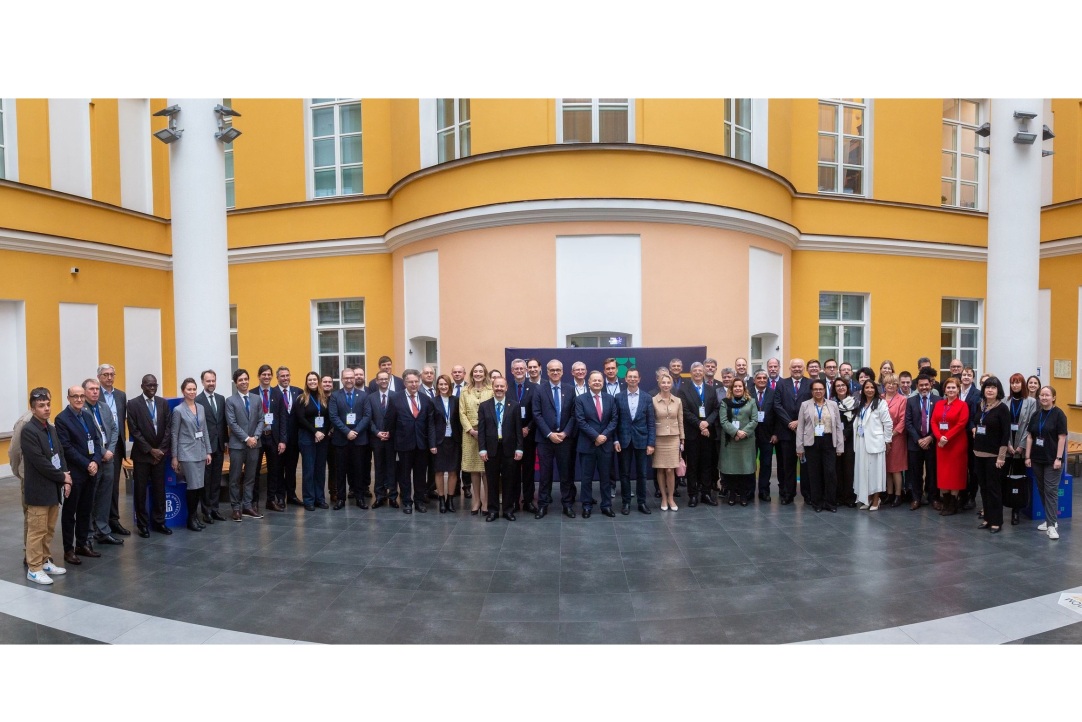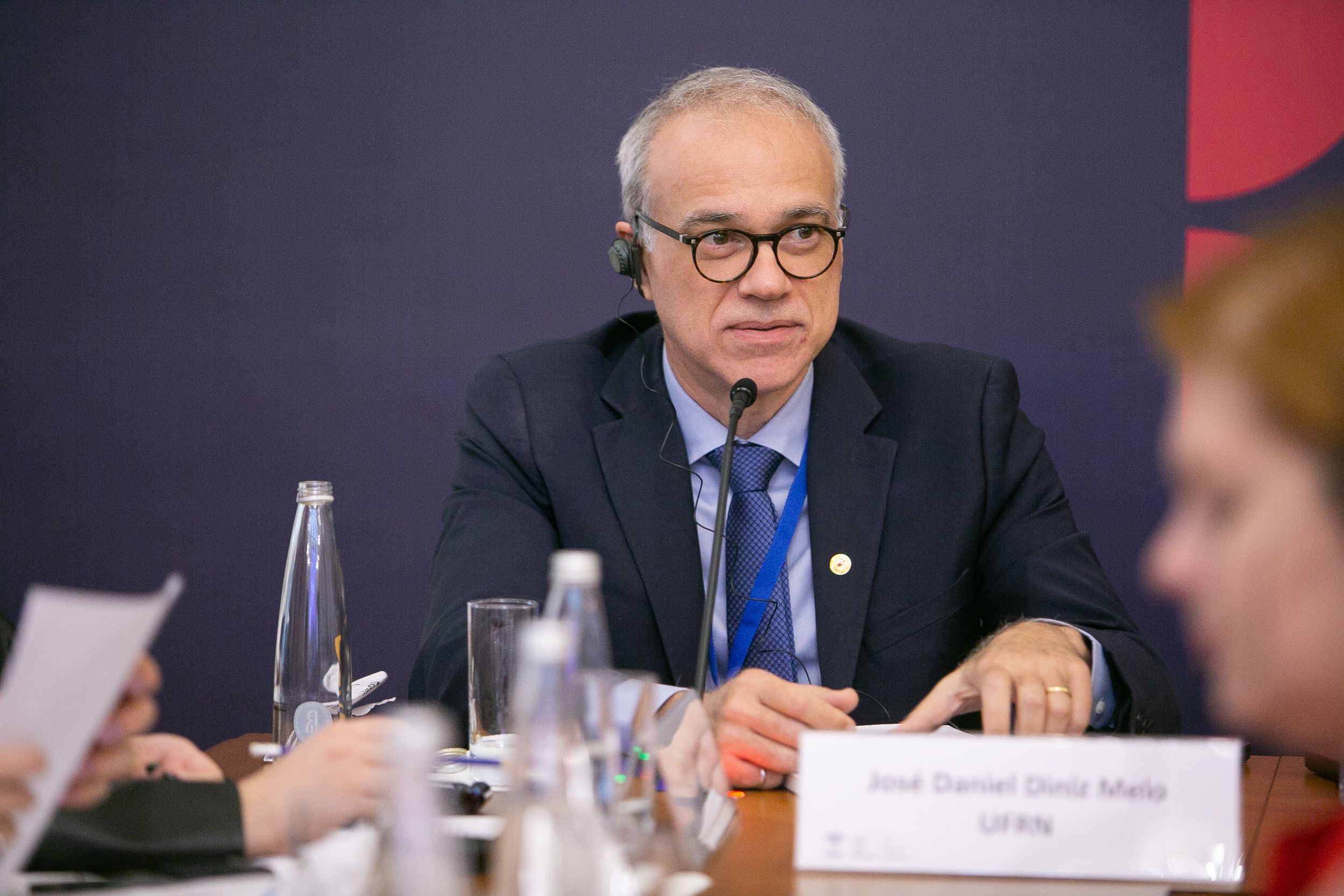HSE University to Expand Cooperation with Brazilian Universities

On October 14, 2024, International Partnership Day Russia-Brazil took place at HSE University. The event was organised in collaboration with the Brazilian Embassy in Moscow and marked the first Brazilian academic and scientific mission to Russia, leading to the signing of cooperation agreements between HSE University and four Brazilian universities.
The first Brazilian academic mission in Russia, which began with International Partnership Day, was opened by HSE Rector Nikita Anisimov.
‘We are pleased to welcome our friends from 17 leading universities of Brazil, the Ministry of Science, Technology, and Innovation, and the National Nuclear Energy Commission of Brazil to HSE University. It is a great honour for us to open up the first Brazilian academic and scientific mission at our university with International Partnership Day Russia–Brazil,’ Anisimov emphasised.
The Rector reminded the audience that HSE first hosted a delegation of representatives from 11 Brazilian universities in 2014, initiating the development of academic contacts and collaborative projects. To date, 11 agreements have been signed with seven Brazilian partners, and a master's programme ‘Science, Technology, and Innovation Management and Policy’ is being implemented with the State University of Campinas (Unicamp).

As noted by Nikita Anisimov, HSE University has developed a comprehensive approach to studying Brazil, with the Faculty of World Economy and International Affairs playing a key role, and the School of Foreign Languages offering students the opportunity to study Portuguese. Additionally, HSE University will continue to participate in all thematic areas of the Brazil–Russia–Belarus cooperation project in research, teaching, innovation, science, and technology (Academic and STI Cooperation Brazil–Russia–Belarus), initiated by the Brazilian Embassy in Russia.
‘I am convinced that today's meeting will create even more favourable conditions for academic exchanges, scientific developments, as well as enhance interaction between Russian and Brazilian scholars,’ the HSE Rector stated.

In his speech, Ambassador Extraordinary and Plenipotentiary of Brazil to Russia, Rodrigo de Lima Baena Soares, highlighted the cooperation between universities in Russia, Belarus, and Brazil. He noted that International Partnership Day at HSE is ‘a great opportunity to further strengthen relations between the Russian and Brazilian scientific communities.’ In his opinion, HSE is a leader in Russian higher education, and its professors and teaching staff are renowned worldwide for their expertise.
Victoria Panova, HSE Vice Rector, noted that last year HSE University launched its first ‘International Academic Cooperation’ competition, which aims to support the development of international scientific collaborations. She said: ‘I am pleased to announce that out of the seven projects supported by the competition, one three-year project is currently being implemented with collaboration between HSE and the State University of Campinas.’

Aleksander Shchetinin, Director of the Department of Latin America at the Russian Ministry of Foreign Affairs, thanked the Ambassador for his initiative in preparing such an extensive programme. ‘Your visit is a significant step in forming broad inter-university partnerships between our countries. We view the arrival of a representative Brazilian academic delegation in Russia as a valuable contribution to strengthening the strategic partnership between Russia and Brazil.’

Ksenia Trinchenko, Director of the Department of International Cooperation at the Russian Ministry of Science and Higher Education, highlighted the significant amount of work done to arrange the delegation's visit to Russia: ‘This is truly a historic event in the educational and scientific fields of both Russia and Brazil, as this is the first time such a large delegation of Brazilian universities and scientific organisations has visited our country. It undoubtedly reflects our countries' readiness to expand cooperation in the humanitarian sphere.’
She also noted that the initiative from the Brazilian side to organise such a large-scale visit to Russia is very relevant and expressed hope that new agreements would be signed during the Brazilian delegation's visit to Russia. ‘This is truly an example of mutually respectful cooperation that considers each other's interests,’ she said.

José Daniel Diniz Melo, Rector of the Federal University of Rio Grande do Norte and President of the National Association of Directors of Federal Higher Education Institutions (Andifes), which includes 190 Brazilian universities, pointed out the need to further expand mutual cooperation, overcoming any challenges. ‘Thanks to bilateral agreements between Russian and Brazilian universities, our countries and citizens are becoming closer to each other every day,’ he commented.

Antonio José de Almeida Meirelles, Rector of the State University of Campinas, stated that his university strives to establish partnerships with institutions from various countries. In his view, HSE and the State University of Campinas share numerous areas of common interest for expanding cooperation and involving more students, professors, teachers, and researchers. ‘We have vast internal opportunities that need to be unlocked,’ the rector concluded.
The Brazilian guests were introduced to the most promising areas of cooperation with HSE University, as well as the university's achievements in global rankings, the development of Russia's first online campus, research in AI, and recruitment of faculty and researchers from the international market.
HSE Vice Rector Victoria Panova highlighted the strategic nature of relations between the two countries, particularly within the BRICS framework, and informed the guests about projects implemented by HSE University during Russia's presidency in this international organisation. ‘HSE University is the key Russian think tank for BRICS research. The BRICS Expert Council–Russia was established at our university by decision of the Russian government and with the support of the Ministry of Foreign Affairs and the Ministry of Finance. We are actively developing partnerships with universities from BRICS countries, as 24% of our partnership agreements are with them,’ Victoria Panova emphasised.
The opening of International Partnership Day Russia-Brazil concluded with signing cooperation agreements between HSE University and the Federal University of Rio de Janeiro, the State University of Campinas, the State University of Santa Catarina, and the University of Brasília. Afterwards, the Brazilian guests were given a tour of the HSE building on Pokrovsky Boulevard.
Representatives of HSE faculties and institutes shared the achievements of their departments in science and advanced research, as well as opportunities for academic cooperation and current projects. These include not only the master's double degree programme ‘Science, Technology and Innovation Management and Policy’ implemented by ISSEK together with the State University of Campinas, but also research projects such as ‘Pluralistic Perspectives on Logic and Formal Philosophy’ as part of the ‘International Academic Cooperation’ competition, and the Consortium of BRICS Law Schools, launched by the Faculty of Law.
The first Brazilian academic and scientific mission to Russia continued during the week. In particular, Moscow State University hosted the first forum of rectors from Brazil, Russia, and Belarus, as well as the BRICS University Presidents Conference.
Representatives from two Brazilian universities—the State University of Campinas and São Paulo State University—were recently honoured guests at a meeting of the Academic Council of HSE University–St Petersburg. They presented the educational opportunities of their universities and expressed interest in expanding academic cooperation. On October 16, 2024, HSE's academic mission to South America began. The HSE delegation from St Petersburg will visit Mexico, Chile, and Brazil.
